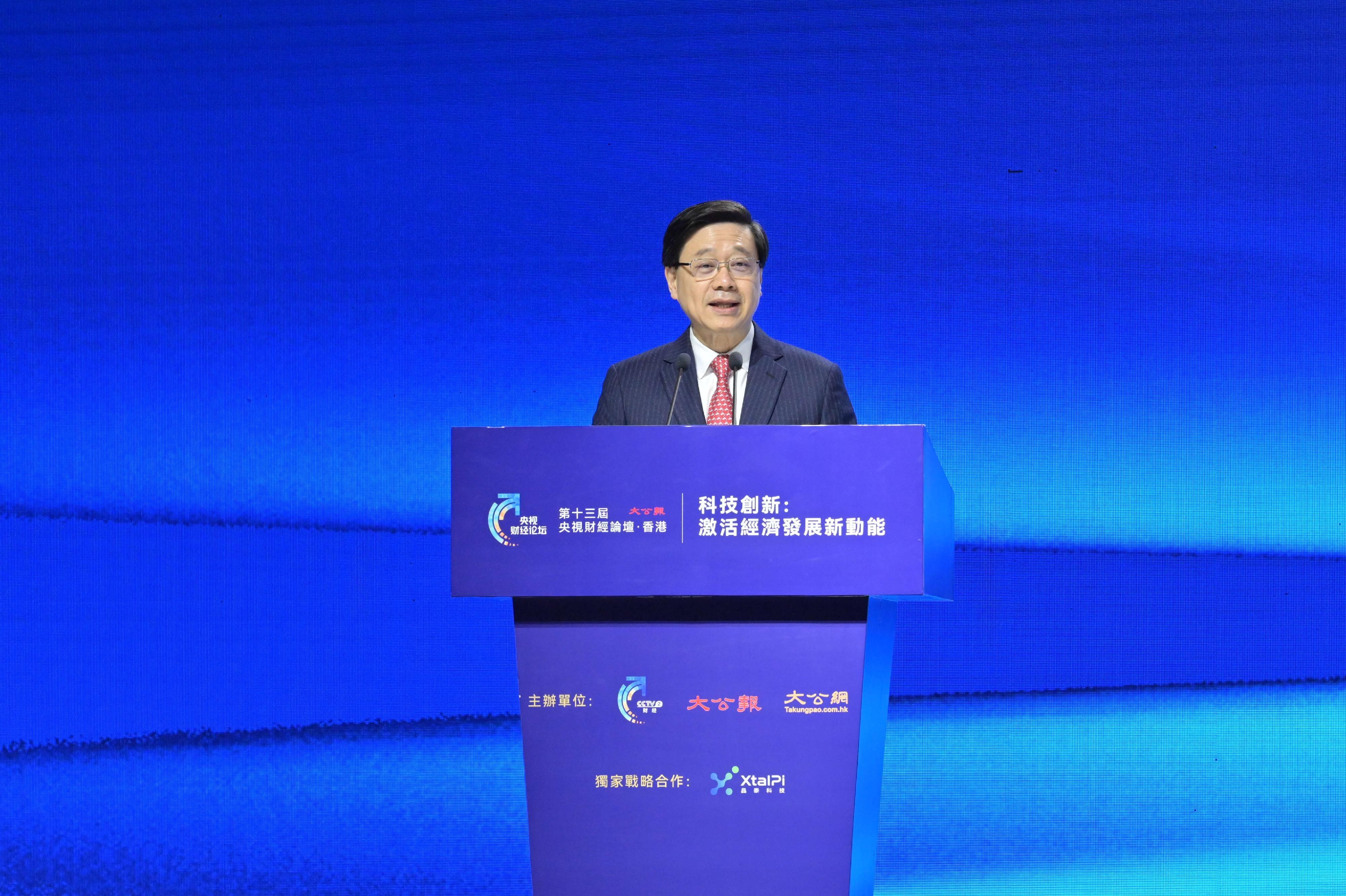 Chief Executive John Lee Ka-chiu delivers a speech during the 13th CCTV Financial and Economic Forum in Hong Kong on Dec 28, 2023. (PHOTO / HKSAR GOVERNMENT)
Chief Executive John Lee Ka-chiu delivers a speech during the 13th CCTV Financial and Economic Forum in Hong Kong on Dec 28, 2023. (PHOTO / HKSAR GOVERNMENT)
The Hong Kong Special Administrative Region government will seize new opportunities brought by the cooperation zones with the mainland, promote cross-boundary flow of innovation and technology elements, and contribute to the coordinated development of the Guangdong-Hong Kong-Macao Greater Bay Area (GBA), Chief Executive John Lee Ka-chiu said at the 13th CCTV Financial and Economic Forum on Thursday.
Lee’s remarks came after the Overall Development Plan for the Qianhai Shenzhen-Hong Kong Modern Service Industry Co-operation Zone and the Overall Development Plan for the Guangdong-Macao Zone in Hengqin were released by the central government on Dec 21, both of which underscored the development of innovation and technology services and the promotion of technological cooperation.
In addition, the Development Plan for Shenzhen Park of Hetao Shenzhen-Hong Kong Science and Technology Innovation Co-operation Zone unveiled in August also serves as a testament of Hong Kong’s efforts in strengthening innovation and technology cooperation with the mainland, Lee said.
As a further step to foster technology cooperation based on the city’s global network, Hong Kong will set up its third InnoHK cluster, putting advanced manufacturing, materials, energy and sustainable development in the spotlight
Regarding the Hetao cooperation zone as an important platform for the collaboration with Guangdong province and Macao, Lee made it clear in his second Policy Address that “the HKSAR government will render its full support and work with Shenzhen to foster the synergistic development of the Hong Kong Park and the Shenzhen Park.”
“We will explore innovative measures for this project, facilitating the mobility of people, goods, capital, and information within the zone,” Lee added.
ALSO READ: HK must be more open-minded in I&T collaboration
As a further step to foster technology cooperation based on the city’s global network, Hong Kong will set up its third InnoHK cluster, putting advanced manufacturing, materials, energy and sustainable development in the spotlight.
According to Lee, the two existing InnoHK research clusters — which prioritize healthcare technologies and artificial intelligence — have brought together seven local universities and research institutions as well as more than 30 top-notch research and development (R&D) facilities from 11 economies, involving 2,500 researchers altogether.
To smooth the cross-boundary flow of innovation and technology elements, the Innovation, Technology and Industry Bureau signed a memorandum of understanding with the Cyberspace Administration of China in June, and launched the pilot implementation arrangements earlier this month, in a bid to streamline the flow of personal information from the mainland cities of the GBA to Hong Kong.
“As a significant policy breakthrough, this move will promote the secure and orderly flow of mainland data within the GBA, and drive the development of digital economy and scientific research, while facilitating the SAR’s integration into national development and making it an international data hub,” Lee said.
Turning to the state of innovation and technology in Hong Kong, Sun Dong, secretary for innovation, technology and industry, said at the same forum that R&D investment on the mainland is mainly made by enterprises, while in Hong Kong the government contributes a larger share of the investment.
READ MORE: CE commits to widening I&T talent pool
Sun emphasized that to change this government-led landscape, a robust innovation and technology ecosystem should be established by promoting the coordinated development of the middle and downstream sectors besides upstream research.


